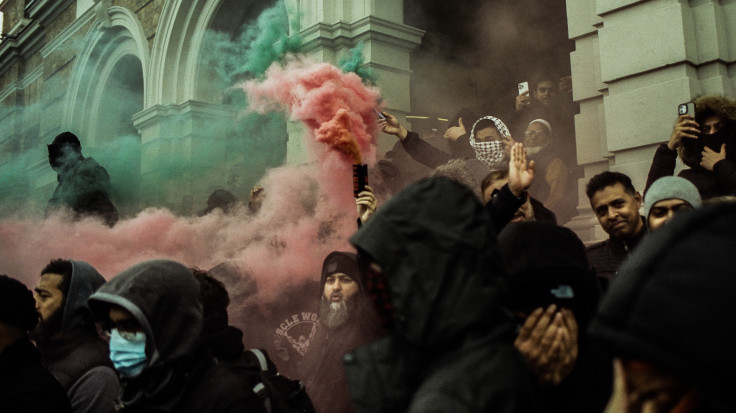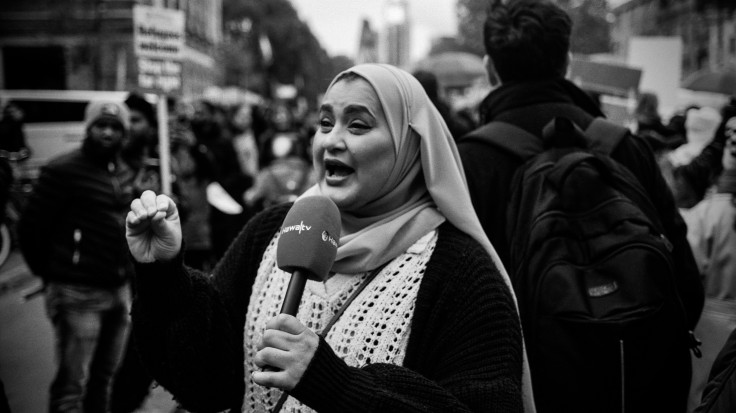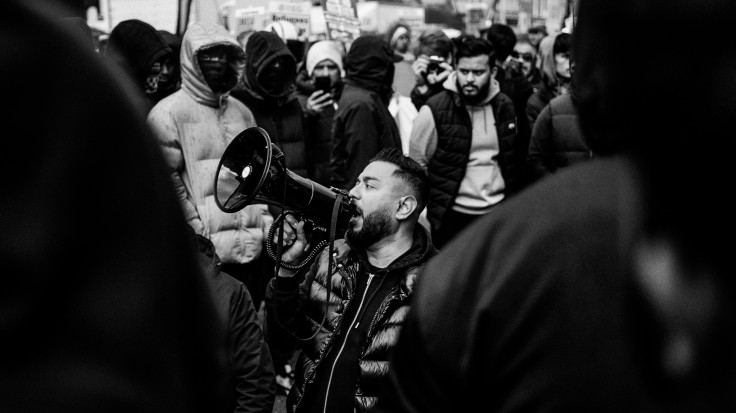Nigel Farage Slammed for Calling East London Protest a 'Foreign Invasion' — Locals Say He's 'Completely Wrong'
A first-hand account reveals that the protest was driven by community defence and solidarity, not aggression, challenging Nigel Farage's portrayal of it as an invasion.

In the ongoing debate around protest, national identity, and community cohesion in the UK, Nigel Farage claimed in a recent video that demonstrators in Whitechapel formed a 'foreign invading army', describing the scene as 'one of the most terrifying things I've ever seen in my life.' His comments came after a protest in East London that followed the Metropolitan Police's decision to ban a planned demonstration by the UK Independence Party (UKIP).
The banned UKIP event was set to be a 'crusade' aimed at 'deporting Islamists,' language that raised safety concerns and fears of incitement. In response, local groups gathered in Whitechapel to assert their presence, framing their demonstration as a community stance against far-right intimidation and hate.
Farage's narrative focused on footage showing predominantly male protesters dressed in black and wearing face coverings, noting the lack of women in the crowd as part of his justification. He further accused the protest of antisemitism, alleging anti-Jewish statements had been made during the event.
Having been present at the demonstration, I can confidently state that Farage's characterisation does not reflect what actually transpired. His description oversimplifies and distorts the event, which was, in essence, a peaceful display of community solidarity in one of London's most diverse boroughs.
A Diverse Community Responds

While there were observable differences between left-wing demonstrators and members of the local Islamic community, these were rooted in distinct political aims, not moral disagreement or hostility. The left-wing groups, including figures like Jeremy Corbyn, came to the protest advocating anti-racism and anti-fascism. Their chants—such as 'Refugees are welcome here' and 'No justice, no peace'—signified solidarity and resistance to far-right ideologies on a national level.
Conversely, many members of the Islamic community, including men wearing face coverings, were present primarily in a protective capacity. Community leaders clarified they were not there to incite violence but to safeguard residents and places of worship should tensions escalate due to far-right provocations. Their presence was rooted in collective responsibility and community defence, not militarism or aggression.
We need to talk about Tower Hamlets. It’s time to wake up. pic.twitter.com/42pc8jXmAN
— Nigel Farage MP (@Nigel_Farage) October 27, 2025
Protection, Not Provocation
An important aspect of their presence was the aim to protect women and families in the area. The face coverings worn by some men were not indicative of fear or exclusion but were part of a collective effort to ensure community safety. These individuals saw themselves as defenders, standing at the front to shield vulnerable residents from potential hostility.
Farage also claimed that antisemitic statements were made during the demonstration. Having spent three hours at the event, I can confirm I did not hear any inflammatory language directed at Jewish people or the Jewish faith. Instead, speakers condemned the Israeli government's actions in Gaza, which many described as genocide.
Understanding the Context
It is crucial to differentiate between antisemitism and anti-Zionism. Criticising a government's policies does not equate to hostility towards a religious or ethnic group. Conflating these issues risks misrepresenting genuine political expression and stifling meaningful debate. Farage's framing overlooks the context of local issues—such as community representation, public services, policing, and housing—that fuel protests in Tower Hamlets.
The borough is among the most ethnically diverse in the UK, with over 40% of residents born outside the UK or identifying as Asian/Bangladeshi. Many demonstrations reflect underlying concerns about social justice and community needs, not foreign invasion or extremism. Simplifying these protests into narratives of 'anti-Semitism' or 'invasion' neglects the real issues residents face and alienates those whose voices are being marginalised.
Language and its Consequences

Using language that portrays protests as militaristic invasions contributes to a hostile climate for community activism. Such rhetoric fosters 'othering,' where certain groups are implicitly cast as outsiders rather than citizens with legitimate concerns. For Tower Hamlets, where community cohesion and integration are ongoing priorities, such labels can undermine efforts to build understanding and trust.
Farage's remarks about the protest have garnered headlines, but describing it as an 'invading army' distorts rather than clarifies the situation. For a borough as complex and diverse as Tower Hamlets, accurate characterisation is essential—both to preserve community identity and to inform the national conversation around protest, migration, and belonging.
While safety and order are legitimate concerns, framing protests as militaristic invasions risks doing more harm than good. It can deepen divisions, hinder dialogue, and dismiss the community's right to peaceful expression.
© Copyright IBTimes 2025. All rights reserved.




















